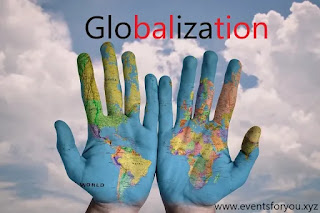Meaning and Definition of Globalization
Globalization is the process by which businesses or other organizations develop international influence on an extensive scale. The term globalization is derived from the word 'globalize', which refers to the interconnection at a global level, mainly concerning over economic system. As per its principle, somebody on one side of the world can interact with another on the other side of the world for mutual benefit. Many renowned sociologists have interpreted globalization to solidify its meaning.
 |
| Globalization and its Dimensions |
History and Factors of Globalization
The term globalization is very recent, establishing its current meaning in the 1970s. In the late 19th century, and early 20th century, the connection of the world's economy and culture grew very quickly. The developed countries(especially from the north) extended their economic, cultural, political, ecological, military, and ideological flow to the developing or least developed countries(especially in the south). This was the first step in globalization. Moreover, the following factors have played important roles in rapid globalization:
- Expansion of technology especially in the fields of transportation (Steam, locomotive, steamship, jet engine, and container ships) and communication(telegraph and its modern offspring, the internet, and mobile phones)
- Removal of international business restrictions by various governments all over the world
- Institutions provide services to care for the conduct of international business
- Awareness and want in consumer about foreign goods, and services
- Improvement of political relationships among major economic powers
- Cross-national cooperation and agreement
- Cooperation among countries on transnational issues
Dimensions of Globalization
According to Manfred Steger, professor of Global Studies, there are 4 dimensions or types of globalization. He also coins and defines the fifth type i.e. the ideological, joining the concept of the other four.
- Economic Globalization: It is the opening and deregulation of commodity, capital, and labor markets in the world. It happens through a rapid increase in cross-border movement of goods, services, technology, corporations, and capital.
- Cultural Globalization: Cultural globalization refers to the transmission of ideas, meanings, ethics, and values around the world. The cultural exchange enables people to take part in extended social relations that go beyond the national borders.
- Political Globalization: This type of globalization tends to influence the weaker or poorer countries through political ideology. The regional or global organizations such as the European Union, the WTO, the G8, the SAARC, etc. work to facilitate international agreement. The most powerful countries like the USA, China, and Russia are spreading their political power in different countries. Just similarly, INGOs influence public policy across national boundaries.
- Ecological Globalization: Ecological globalization refers to the internationally coordinated practices, regulations, or treaties related to environment or nature protection. The global program initiated against climate change can be taken as its example.
- Ideological Globalization: The ideological globalization tries to influence others through different norms, claims, beliefs, and narratives. For example the spreading of Christianism in the least developed countries.
Advantages and Disadvantages of Globalization
As a response to globalization, some countries have embraced isolationist policies. The fear of globalization thus is known as Globophobia. For example, the North Korean government makes it very difficult for foreigners to enter the country. But we cannot ignore the flaws of globalization. The advantages and disadvantages of globalization are:
Merits/Strength/Advantages of Globalization
- Promotion of trade and commodities
- Increase in foreign aid to the poor countries
- Accessibility of quality goods at a cheap price.
- Standard of life in underdeveloped and developing countries improve through quality goods and services.
- Controlling of price hike due to high competition
- Publicity and exchange of cultures, way of life.and politics.
- Extension of international relationship and cooperation.
Demerits/Flaws/Disadvantages of Globalization
- The gap between the poor and rich countries increases
- Infectious, epidemics or endemic diseases may spread
- Domination or hegemony to the poor countries increases
- Influence of foreign culture increases and indigenous culture is endangered
- Less benefit to the poor countries due to poor technological advancement
- Increase of illegal trading of drugs, weapons, and other restricted things
.

No comments:
Post a Comment
Please do not enter any spam link in the comment box.